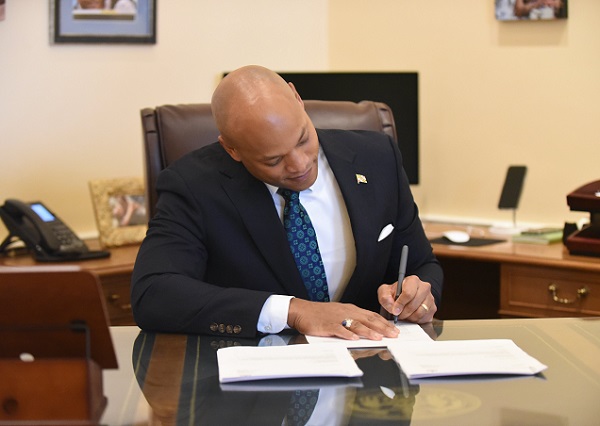ANNAPOLIS, MD—Governor Wes Moore this week presided over the Moore-Miller Administration’s third bill signing. The governor implemented a service year program for graduating seniors, signed investments in education, invested millions in aid to make Maryland’s communities safer, and enacted legislation to help rebuild the state government.
“Leaving no one behind means delivering a world-class education to all of our children, ensuring Marylanders are safe in their communities, and offering one-of-a-kind opportunities to serve,” said Gov. Moore. “Today I’m proud to sign legislation that will help all of that happen here in Maryland.”
“Today, our administration is taking action that will set Maryland apart as a state that provides a quality K-12 education to its children, and a pathway for young people to serve their communities and gain real-world professional skills,” said Lt. Gov. Miller. “Our budget addresses the biggest issues facing Marylanders and is a game changer for Maryland families struggling with mental health challenges and substance use disorders.”
Included among Governor Moore’s champion pieces of legislation signed yesterday are:
S.B. 551, The SERVE Act of 2023, creating a one-of-a-kind service-year option sponsored by state government. It establishes the Department of Service and Civic Innovation, which will promote service and volunteerism in the state; establish the Secretary of Service and Civic Innovation and the duties and responsibilities of the secretary; alter the provisions of the Maryland Corps Program, including requiring the Department to administer the program; and establishing the Young Adult Service Year Option Pathway Fund.
H.B. 982, State Employees – Programs and Scholarships for Human Services Careers and Probation Agents and State Contributions to Supplemental Retirement Plans, which will help Maryland rebuild the state workforce. It establishes the Pilot Program for Human Services Careers, altering the eligibility criteria for the Maryland Loan Assistance Repayment Program for Police Officers and the Maryland Police Officers Scholarship Program to include probation agents who work for the Department of Public Safety and Correctional Services. It establishes the Pilot Program for Human Services Careers Scholarship, requiring the Maryland Higher Education Commission to make awards from the Human Services Careers Scholarship Pilot Program in fiscal year 2024.
H.B. 200, The Budget Bill, will provide historic investments in education, including a record $8.7 billion investment in Maryland’s K-12 public schools, a record $393 million for Maryland’s 15 local community colleges; and over $420 million in state support for Maryland’s historically black colleges and universities. This will also put major investments into public safety, $122 million in aid for local police departments and expansion of the Office of the Attorney General and the Office of the Public Defender, $70 million in direct local law enforcement grants, $35 million in General Funds for Victims of Crime Act (VOCA) funding, $18 million for the Correctional Officers and Parole and Probation Agents retention incentive bonus program, and $6.4 million and more than 40 additional positions to expand the State Police Gun Center and Firearms Licensing Division–along with a record $1.3 billion in direct state support for mental health and substance use programs, $409 million to fund provider rate increases in the fields of behavioral health, developmental disabilities, Medicaid, and other services, and more than $154 million to expand adult dental coverage to Medicaid clients and $25 million to reduce waitlists for programs that allow seniors to age in their communities.
A complete list of bills signed into law this week is available online here.
Do you value local journalism? Support NottinghamMD.com today.

